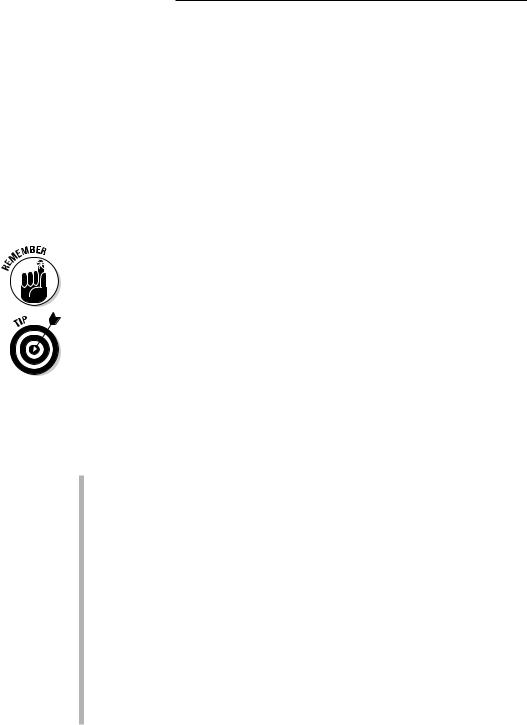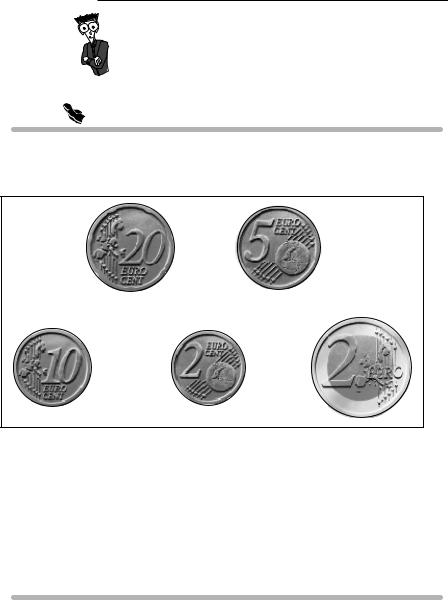
- •About the Authors
- •Dedication
- •Acknowledgments
- •Table of Contents
- •Introduction
- •About This Book
- •Conventions Used in This Book
- •Foolish Assumptions
- •How This Book Is Organized
- •Icons Used in This Book
- •Where to Go from Here
- •The French You’re Familiar With
- •Idioms and Popular Expressions
- •Key Parts of Speech
- •Cavorting with Verbs
- •Forming Sentences and Questions
- •The French Alphabet
- •Uttering Vowel and Consonant Sounds
- •Greetings: Formal and Friendly
- •Asking Questions to Get to Know People
- •Counting Your Lucky Stars: Numbers
- •Using the Calendar and Dates
- •Telling Time in French
- •Discussing Where You Live with the Verb “Habiter”
- •Discussing Daily Routine with Reflexive Verbs
- •Using Possessive Adjectives to Introduce Your Family Members
- •Basic Questions and Polite Expressions
- •Stating Your Preferences
- •Talking about Your Livelihood
- •Chatting about the Weather
- •Deciding to Keep in Touch
- •Getting Direction about Directions
- •Dining Out
- •Going to the Market
- •Going Shopping
- •Going Out with the Verb “Sortir”
- •Having Fun with the Verb “S’amuser”
- •Oh, the Places You’ll Go!
- •Making Plans with Friends
- •Making a Phone Call
- •Livin’ in the Past: Using the Past Tense
- •Playing Sports and Games
- •Going to the Beach
- •Setting Up Camp
- •Enjoying Quieter Pursuits
- •Where Do You Want to Go?
- •Getting Ready for Your Trip
- •Getting Current with Currency
- •Going to the Bank
- •Using Credit Cards and ATMs
- •Getting through the Airport
- •Navigating Buses, Trains, and Subways
- •Getting Around by Car
- •Finding Accommodations
- •Checking In to a Hotel
- •Checking Out of a Hotel
- •Getting Help Fast
- •Getting Medical Help
- •Handling Legal Matters
- •Label the Things in Your House
- •Write Your Shopping Lists in French
- •Listen to French Music
- •Watch French Movies
- •Tune in to TV5
- •Read French Publications
- •Take a Class
- •Join a French Association
- •Join an Online Chat or Pen Pal Forum
- •Using “Tu” When You Mean “Vous”
- •Using “Bonne nuit!” for Good-Bye
- •Using “Garçon” or “Porteur” to Address Service Staff
- •Saying “Je suis excité(e)” to Indicate Excitement
- •Saying “Je suis chaud(e)/froid(e)” to Say You’re Hot or Cold
- •Saying “Je suis plein/e” to Mean You’re Full
- •Using “de la glace” to Request Ice
- •Using “Je suis . . . ans” to Tell Your Age
- •Asking for Change with “J’ai besoin de change”
- •Using the Verb “Visiter” in Reference to People
- •“À mon avis”
- •“C’est pas vrai”
- •“Avec plaisir”
- •“C’est génial”
- •“À votre santé”
- •“À vos souhaits”
- •“Quelle horreur!”
- •“À bientôt”
- •“Passez-moi un coup de fil!”
- •“On y va!” or “Allons-y!”
- •“Je n’en sais rien”
- •“Je n’en reviens pas”
- •“Ça vaut la peine”
- •“C’est pas grave”
- •“N’importe”
- •“Tu cherches midi à 14h”
- •“Prenons un pot!”
- •Regular French Verbs
- •Auxiliary French Verbs
- •Track Listing
- •Customer Care
- •Index

234 Part III: French on the Go
Using Credit Cards and ATMs
Sometimes a store may not accept your local traveler’s check — a situation that happens more frequently in Europe than in the United States. In that event, you’ll want to have some extra cash when you go shopping. Another option is to use une carte de crédit (ewn kahrt duh krey-dee) (a credit card) or un distributeur (de billets) (uhN dees-tree-bew-tuhr [duh bee-yeh]) (an automated teller machine, ATM).
You can find ATMs in big and small towns, usually at a bank, in a shopping area, at train stations, at post offices, and all sorts of other places. You can access them all day and night. . . unless, of course, they are temporarily out of order. But nothing is perfect, right?
Credit cards are widely accepted in French-speaking countries, but some stores have a minimum purchase requirement. For example, they may not accept credit cards if you spend under 20 euros.
If you use your ATM card to exchange money, the exchange rate you get is definitely the most favorable because you’re making a direct bank exchange between the ATM’s bank and your bank. The fee is slightly more if you use your credit card to access cash at an ATM because most credit cards charge a fee for cash advances.
Machines basically work the same way elsewhere as they do in the U.S. Usually you can choose your prompts to be in English, but just in case the machine doesn’t give you a language choice, here are the French phrases and instructions you need to know to use an ATM:
Insérez votre carte svp. (aN-sey-rey vohh-truh kahrt seel vooh pleh.) (Insert your card, please.)
Tapez votre code svp. (tah-pey vohh-truh kohhd seel vooh pleh.) (Type your PIN, please.)
Retrait d’espèces. (ruh-treh deh-spehs.) (Cash withdrawal.)
Voulez-vous un reçu? (vooh-ley-vooh uhN ruh-sew?) (Would you like a receipt?)
Carte en cours de vérification. (kahrt ahN koohr duh vey-ree-fee-kah- syohN.) (Checking your balance.)
Patientez svp. (pah-syaN-tey seel vooh pleh.) (Wait, please.)
Reprenez votre carte svp. (ruh-pruh-ney vohh-truh kahrt, seel vooh pleh.) (Take your card, please.)
Prenez votre argent svp. (pruh-ney vohh-truh ahr-zhahN seel vooh pleh.) (Take your money, please.)
www.ATIBOOK.ir

Chapter 14: Dealing with Money in a Foreign Land 235
N’oubliez pas votre reçu. (nooh-blee-yey pah vohh-truh ruh-sew.) (Don’t forget your receipt.)
Saying that you can, want, or have to do something
Verbs such as pouvoir (pooh-vwahr) (to be able to), vouloir (vooh-lwahr) (to want), or devoir (duh-vwahr) (to have to, to must) require a verb after them in the infinitive form to express what you can, want, and must do or have to do. Here are some examples:
Tu peux aller au distributeur. (tew puh ah-ley oh dees-tree-bew-tuhr.) (You can go to the ATM.)
Vous pouvez insérer votre carte. (vooh pooh-vey aN-sey-rey vohh-truh kahrt.) (You can insert your card.)
Pouvez-vous signer ici? (pooh-vey vooh see-nyey ee-see?) (Can you sign here?)
Je veux changer de l’argent. (zhuh vuh shahN-zhey duh lahr-zhahN.) (I want to change money.)
Il doit aller à la banque. (eel dwah-tah-ley ah lah bahNk.) (He has to go to the bank.)
Vous devez taper votre code. (vooh duh-vey tah-pey vohh-truh kohhd.) (You have to type in your PIN.)
For the conditional form and usage of the verbs pouvoir and vouloir, refer to Chapter 8. You can find the present tense conjugations of pouvoir and devoir in Chapter 9.
Using disjunctive pronouns
After prepositions such as pour (poohr) (for), avec (ah-vehk) (with), sans (sahN) (without), and so on, the French use disjunctive, or stress, pronouns to refer to people. Table 14-2 lists the disjunctive pronouns.
Table 14-2 |
French Disjunctive Pronouns |
Pronoun |
Example |
moi (mwah) (me) |
pour moi (poohr mwah) (for me) |
toi (twah) (you [singular]) |
avec toi (ah-vehk twah) (with you) |
|
|
|
(continued) |
www.ATIBOOK.ir

236 Part III: French on the Go
Table 14-2 (continued)
Pronoun |
Example |
lui/elle (lwee/ehl) (him/her) |
sans lui (sahN lwee) (without him); |
|
pour elle (poohr ehl) (for her) |
nous (nooh) (us) |
avec nous (ah-vehk nooh) (with us) |
|
|
vous (vooh) (you [singular formal or plural]) |
sans vous (sahN vooh) (without you) |
|
|
eux/elles (uh/ehl) (them [masc. plural/ |
pour eux (poohr uh) (for them); avec |
fem. plural]) |
elles (ah-vehk ehl) (with them) |
Here are some sentences using these disjunctive pronouns:
Pouvez-vous traduire pour moi? (pooh-vey-vooh trah-dweer poohr mwah?) (Can you translate for me?)
Avez-vous votre carte de crédit avec vous? (ah-vey-vooh vohh-truh kahrt duh krey-dee ah-vehk vooh?) (Do you have your credit card with you?)
Il a une pièce d’identité avec lui. (eel ah ewn pyehs dee-dahN-tee-tey ah-vehk lwee.) (He has an ID with him.)
When you are conducting any type of transaction, instead of always using je (zhuh) (I) or nous (nooh) (we), you can use the impersonal on (ohN) (one) in French. For example, you can ask On peut payer ici? (ohN puh pey-yey ee-see?) (Can we can pay here? [Literally, Can one pay here?]) On peut sounds a lot better to French ears than the good old je peux (zhuh puh) (I can) or nous pouvons (nooh pooh-vohN) (we can) form. On (ohN) (one, in the impersonal meaning) is what you usually hear. Sometimes on also replaces the they form, maybe just to be more casual: Ah, ils ouvrent! (ah, eel-zooh-vruh!) becomes Ah, on ouvre! (ah, ohN-nooh-vruh!), both of which mean Ah, they are opening! For more on on, check out Chapter 2.
Talkin’ the Talk
Julie bought a couple of travel guides and tells le vendeur (luh vahNduhr) (the salesperson) that she wants to pay with her credit card. Unfortunately, the store does not accept credit cards. (Track 16)
Julie: Bonjour, monsieur, vous acceptez les cartes de crédit? bohN-zhoohr, muh-syuh, vooh-zah-kseh-ptey ley kahrt duh krey-dee?
Hello, sir, do you accept credit cards?
Le vendeur: Ah, non, désolé.
ah, nohN, dey-zoh-ley.
Oh, no, sorry.
www.ATIBOOK.ir

Chapter 14: Dealing with Money in a Foreign Land 237
Julie: Zut! Alors, où est-ce qu’il y a un distributeur près d’ici? zewt! ah-lohr, ooh ehs-keel ee ah uhN dees-tree-bew- tuhr preh dee-see?
Darn! Then, where is there an ATM close to here?
Le vendeur: Il y en a un en face.
eel ee ahN-nah uhN ahN fahs.
There is one across the street.
Julie: Je reviens tout de suite. Pouvez-vous garder mes guides?
zhuh ruh-vyaN tooht sweet. pooh-vey-vooh gahr-dey mey geed?
I’ll be back right away. Can you hold my guides?
Le vendeur: Avec plaisir. Ne vous inquiétez pas.
ah-vehk pleh-zeer. nuh vooh-zaN-kee-ey-tey pah.
Gladly. Don’t worry.
Julie: Merci, à tout de suite. mehr-see, ah tooht sweet.
Thank you, I’ll be right back.
Words to Know
vous acceptez |
vooh-zah-kseh-ptey |
you accept |
|
|
|
alors |
ah-lohr |
then, so then |
|
|
|
en face |
ahN fahs |
across the street |
|
|
|
je reviens |
zhuh ruh-vyaN |
I’ll come back |
|
|
|
à tout de suite |
ah tooht sweet |
I’ll be right back |
|
|
|
ne vous inquiétez |
nuh vooh-zaN-kee- |
don’t worry |
pas |
ey-tey pah |
|
|
|
|
www.ATIBOOK.ir

238 Part III: French on the Go
 Fun & Games
Fun & Games
Identify each of the following French coins and indicate what symbol appears on the back.
A. |
B. |
C. D. E.
Coin Symbol
A.______________________ ______________________
B.______________________ ______________________
C.______________________ ______________________
D.______________________ ______________________
E.______________________ ______________________
www.ATIBOOK.ir
